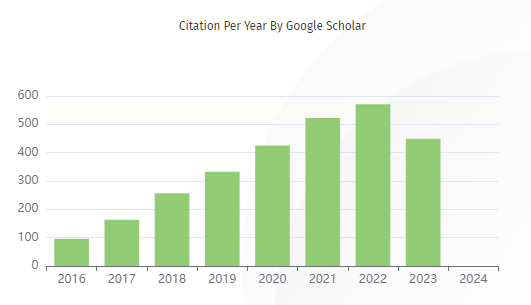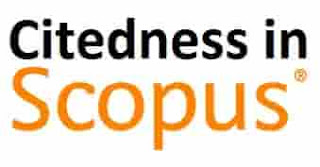Dampak Integrative Leadership dan Employee Engagement terhadap Perilaku Extra-Role
DOI:
https://doi.org/10.12695/jmt.2016.15.1.3Abstract
Abstrak. Organisasi telah lama tertarik pada bagaimana pegawai memikirkan dan merasakan pekerjaan mereka dan apa yang menyebabkan pegawai bersedia untuk mendedikasikan diri untuk organisasi. Para peneliti berpendapat bahwa gaya kepemimpinan dan engagement merupakan variabel motivasi yang mengarah perilaku extra-role dan tingkat prestasi kerja yang tinggi. Penelitian ini bertujuan untuk menganalisis pengaruh integrative leadership dan employee engagement terhadap extra-role, dengan mengambil studi kasus pada guru di 27 Sekolah Menengah Atas swasta di Madiun, dengan responden sebanyak 319 guru tetap. Metode pengambilan sampel yang digunakan adalah quota sampling. Pengumpulan data primer dengan metode cross sectional dengan menggunakan kuesioner. Analisis ini digunakan analisis regresi berganda. Hasil analisis regresi berganda menunjukkan bahwa :1)integrative leadership berpengaruh positif dan signifikan terhadap perilaku extra-role; 2)employee engagement berpengaruh positif dan signifikan terhadap perilaku extra-role.
Kata Kunci: integrative leadership, employee engagement, motivasi, perilaku extra-role, prestasi kerja
Abstract. Organizations have long been interested in how employees think and feel about their jobs and what employees are willing to dedicate to the organization. Leadership style and employee engagement has been found to be positively related to extra-role b behavior and individual job performance. This study aims to analyze the influence of integrative leadership and employee engagement on extra-role b behavior, a case study of teacher in 27 particular high schools in Madiun, as many as 319 permanent teachers. The sampling method is quota sampling. The collection of primary data by cross sectional using questionnaires. The analysis is used multiple regression analysis. Results of multiple regression analysis showed that: 1) integrative leadership had significant and positive direct effect on extra-role behavior; 2) employee engagement had significant and positive effect on extra-role behavior.
Keywords: integrative leadership, employee engagement, motivation, extra-role Behavior, job performance.
Downloads
References
Barbuto, J. E., Jr., & Wheeler, D. W. (2006). Scale development and construct clarification of servant leadership. Group & Organization Management, 31(3), 300-326.
Baumruk R., & Gorman B. (2006). Why managers are crucial to increasing engagement. Melcrum Publishing.
Crabtree, S. (2011). What your employees need to know. [Diunduh dari http://businessjournal.gallup.com/content/146996/employees-need
Fernandez, S., Cho, Y. J., & Perry, J. L. (2010). Exploring the link between integrated leadership and public sector performance. The Leadership Quarterly, 21, 308 - 323.
Federman, B. (2009). Employee engagement: a road for creating profits, optimizing perfomance, and increasing loyalty. San Fransisco: Jossey Bass.
Ghozali, I. (2006). Aplikasi analisis multivariate dengan SPSS. Cetakan keempat. Badan Penerbit Universitas Diponegoro. Semarang.
Gordon, H .P. (2006). Recrafting work: a model for workplace: engagement and meaning. [Diunduh dari http://repository.upenn.edu/cgi/viewcontent.cgi?article=1006&context=mapp_capstone]. (Diakses pada 30 Juni 2014).
Hewitt Assosiate. (2008). Leadership Opportunities: Increased Bottom Line Results Through Improve Staff Engagement. Modul.
Hughes, J. C., & Rog, E. (2008). Talent management, a strategy for improving employee recruitment, retention, and engegement within hospitality organization. International Journal of Contemporary Hospitality Management, 20 (7), 743-757.
Huxham, C., & Vangen, S. (2000). Leadership in the shaping and implementation of collaboration agendas: how things happen in a (not quite) joined-up world. Academy of Management Journal, 43(6), 1159-1175.
May, D.R., Gilson, R.L. & Harter, L.M. (2004). The psychological conditions of meaningfulness,safety and availability and the engagement of the human spirit at work, Journal of Occupational & Organizational Psychology, 77: 11-37
Mira, W. S., & Margaretha, M. (2012). Pengaruh sevant leadership terhadap komitmen organisasi dan organization citizenship behavior. Jurnal Manajemen, 11 (2), 99-116.
Kingsley & Associates. (2008). Employee surveys. [Diunduh dari http://kingsleyassociates.com/services/employee-surveys/. (Diakses pada 30 Juni 2014).
Kruse, K. (2012). What is employee engagement. [Diunduh dari http://www.forbes.com/sites/kevinkruse/2012/06/22/employee-engagement-what-and-why/#21f2681b4629]. (Diakses pada 10 April 2016). (Diakses pada 30 Juni 2014).
Liden, R.C., Wayne, S.J. & Sparrowe, R.T. (2000). An examination of the mediating role of psychological empowerment on the relations between the job, interpersonal relationships, and work outcomes. Journal of Applied Psychology, 85(3), 407-416.
Organ, D. W. (2005). Organizational citizenship behavior. its nature, antecendents and consequences. California: Sage Publications, Inc.
Page, D., & Wong, T. P. (2003). Servant leadership: an opponent-process model and the revised servant leadership profile. Paper presented at the Servant Leadership Roundtable, Regent University, Virginia Beach, VA. [Diunduh dari http://www.regent.edu/acad/cls/2003ServantLeadershipRoundtable]. (Diakses pada 30 Juni 2014).
Podsakoff, P.M., Mackenzie, S.B., Paine, J.B, & Bachrach, D.G. (2000). Organizational citizenship behaviors: a critical review of the theoretical and empirical literature and suggestions for future research. J. Manage, 26 (3), 513-563.
Rafferty A. M., Maben J., West E., & Robinson D. (2005). What makes a good employer? Issue Paper 3 International Council of Nurses Geneva.
Ram, P., & Prabhakar, G.V. (2011). The role of employee engagement in work-related outcomes. Interdisciplinary Journal of Research in Business, 1(3), 47-61.
Robinson, D., Perryman, S & Hayday, S. (2004). The drivers of employee engagement. [Diunduh dari http://www.employment-studies.co.uk/system/files/resources/files/408.pdf]. pada 10 April 2016.
Robert, D.R., & Davenport, T.O. (2002). Job engagement: why it's important and how to improve it. Employment Relations, 24(3), 21-29. http://dx.doi.org/10.1002/ert.10048.
Saks, A.M. (2006). Employee engagemet: antecedents and consequences. Journal of Managerial Pshycology, 21(7), 600-619.
Saragih, S. & Margaretha, M. (2013). Employee engagement: studi pada industri perbankan. Seminar Nasional dan Call for paper, Universitas Maranatha, Bandung, 19-20 Juni 2013; ISSN 978-979-19940-2-6. Diunduh dari (Diakses 30 Juni 2014).
Schaufeli, W.B., Salanova, M., Gonzalez- Roma, V. & Bakker, A.B. (2002). The measurement of engagement and burnout: a two sample confirmatory factor analytic approach. Journal of Happiness Studies: 3, 71–92.
Setiawan, I.A. (2012). Hubungan antara perceived organizational support, job engagement, dan task performance dengan organizational citizenship behavior. Jurnal Sains Manajemen & Akuntansi, IV (2).
Srimulyani, V.A., & Hutajulu, K. (2013). Dampak servant leadership terhadap pembelajaran organisasi dan kinerja guru: studi pada guru-guru SMA dan SMK se-Kota Madiun. Jurnal Manajemen dan Bisnis Indonesia; 1(1), 28-41.
Srimulyani, V.A., & Hutajulu, K. (2012). anteseden organizational citizenship behavior: studi pada guru-guru SMA di Kota Madiun. Jurnal Widya Warta, 01 Tahun XXXVI/Januari.
Thomas, K. (2009). Intrinsic motivation at work, 2nd Edition: What Really Drives Employee Engagement. Berrett-Koehler Publisher, Inc. San Fransisco.
Downloads
Submitted
Accepted
Published
How to Cite
Issue
Section
License

This work is licensed under a Creative Commons Attribution-NonCommercial-ShareAlike 4.0 International License. Copyright @2023. This is an open-access article distributed under the terms of the Creative Commons Attribution-NonCommercial-ShareAlike 4.0 International License (http://creativecommons.org/licenses/by-nc-sa/4.0/) which permits unrestricted non-commercial used, distribution and reproduction in any medium.

















